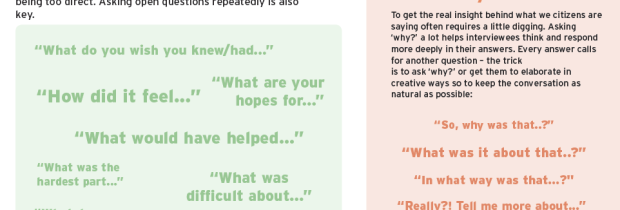Better consultation: “It’s about learning to say hello, excuse me, & thank you”
Consultation. Public Engagement. Codesign. Coproduction. These are not the same thing (and differentiating between them is vital in order to really do what it is you need to do, for the circumstances you’re in). But the critical importance of getting better at listening to and communicating with the public – whether for formal consultation (big C) purposes or more creative codesign – needs our attention.
In this post, the wonderful @lesteph reports that the digital team at the Department of Health have appraised the experiments they’ve tried and sometimes tough lessons they’ve learned from iterating their organisation’s approach to online consultation over the last few years. We think the six conclusions they draw pack a massive punch for anyone aiming to consult or engage with the public in any way – via digital or other means:
- Check that there is actually appetite to engage
- Make it as easy as possible for people to take an action
- Reach out to the people you want to take part
- Know how you’re going to analyse the response
- Say thank you, and then keep people who take part updated
- No amount of digital engagement expertise will make much difference to a 600 page consultation with 70 impenetrable questions
As Steph says:
I think Stephen and Susy absolutely nail it in their conclusions above. Do those things, and it will probably work. Miss out one or more, and it probably won’t.
We need to take these things seriously. How many engagement or consultation efforts really deliver on ALL of these priorities? Engaging (or consulting) well requires a well thought-through enquiry framework; low barriers to entry; up-front preparation for analysis; and continued dialogue.
But there’s one addition that we think needs to be added: there needs to be a commitment to act on what you hear and learn. It seems so obvious, but – seriously – it’s often not happening. Public services (broadly defined) are still not set up with the capabilities, support and NB permissions needed to listen, AND learn, AND respond. We said a bit more about that here. Responding might mean reconsidering what you were intending to do; being open to new ideas; being prepared to go back and challenge the policy or the commissioning plan; having difficult conversations internally and externally. It definitely means going back and explaining to the public how you have understood their collective messages, and what you intend to do (differently) as a result.
Unless the organisation is wired to respond, we risk going round in circles: we squander public trust and we’ll miss out on all the potential that comes from engaging (deeply and meaningfully) with the insightful, idiosyncratic, creative and usually very helpful Great British Public.
